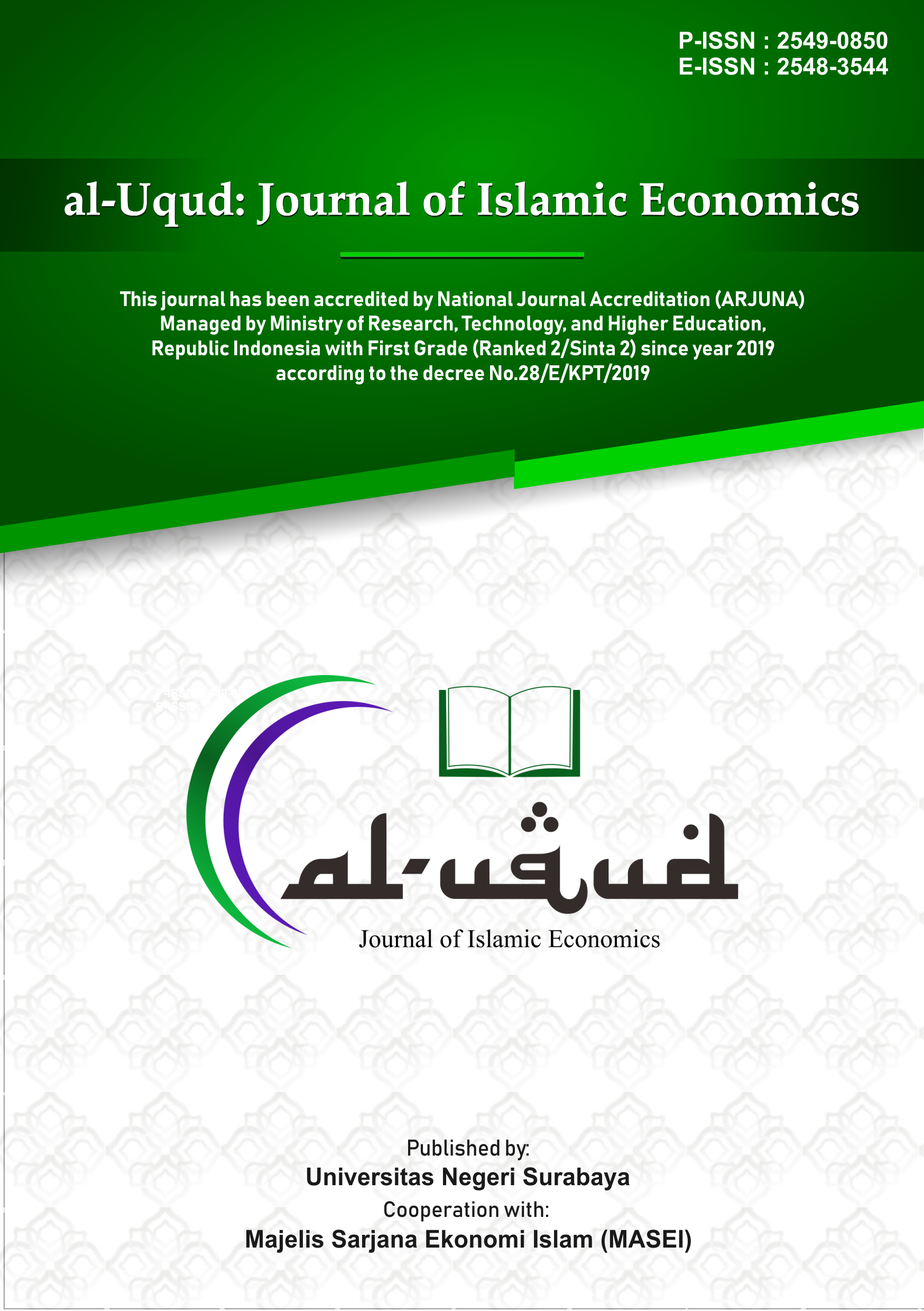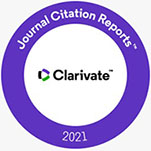Is Sharia peer-to-peer lending in Indonesia accountable and transparent?
DOI:
https://doi.org/10.26740/al-uqud.v9n1.p96-109Keywords:
Peer-to-peer lending, Accountability, TransparencyAbstract
Financial technology is developing in Indonesia, especially in peer-to-peer landing. Based on data from the Indonesia Authority of Financial Service (OJK), there are 102 peer-to-peer lending institutions in Indonesia with 8 of them using the Sharia system. Every Sharia-based transaction must ensure its accountability not only to the public but also to God. Accountability can be seen in the financial statements and annual reports were transparent and accountable. This study aims to see the transparency and accountability of peer-to-peer lending in Indonesia. This study used a qualitative phenomenological approach to observe the problem. The results showed that not all peer-to-peer lending sharia in Indonesia is transparent and accountable. Only three out of eight peer-to-peer landings are transparent and accountable.
References
AAOIFI. (2020). AAOIFI Governance Standard (GS) 11. http://aaoifi.com/issued-standards-2/?lang=en
Abdullah, N. A. I. N., & Haron, R. (2022). ESG reporting practices among Islamic banks: a global perspective. IIUM Law Journal, 30(S2), 1–36. https://doi.org/10.31436/iiumlj.v30iS2.755
Agustin, F., Muhtadi, R., & Sahal, S. (2023). The Importance of Implementing Environment, Social and Government (ESG) and Maqasid Sharia-Based Islamic Finance in Islamic Bank. Journal of Islamic Economic Laws, 6(2), 133–158. https://doi.org/10.23917/jisel.v6i2.21214
Amran, A., Fauzi, H., Purwanto, Y., Darus, F., Yusoff, H., Zain, M. M., Naim, D. M. A., & Nejati, M. (2017). Social responsibility disclosure in Islamic banks: a comparative study of Indonesia and Malaysia. Journal of Financial Reporting and Accounting, 15(1), 99–115. https://doi.org/10.1108/JFRA-01-2015-0016
Arini. (2021). Pengungkapan sustainability report pada kinerja bank: perspektif maqashid syariah. Masters thesis, Universitas Negeri Malang.
Baron, R. (2014). The evolution of corporate reporting for integrated performance. Background Paper for the 30th Round Table on Sustainable Development, 25, 1–35.
Bassen, A., & Kovács, A. M. (2020). Environmental, social and governance key performance indicators from a capital market perspective. Springer.
Belal, A. R., Abdelsalam, O., & Nizamee, S. S. (2015). Ethical Reporting in Islami Bank Bangladesh Limited (1983–2010). Journal of Business Ethics, 129(4), 769–784. https://doi.org/10.1007/s10551-014-2133-8
Buallay, A. (2019). Is sustainability reporting (ESG) associated with performance? Evidence from the European banking sector. Management of Environmental Quality: An International Journal, 30(1), 98–115. https://doi.org/10.1108/MEQ-12-2017-0149
Boudawara, Y., Toumi, K., Wannes, A., & Hussainey, K. (2023). Shari’ah governance quality and environmental, social and governance performance in Islamic banks. A cross-country evidence. Journal of Applied Accounting Research, 24(5), 1004–1026. https://doi.org/10.1108/JAAR-08-2022-0208
Camilleri, M. A. (2017). Corporate sustainability and responsibility: creating value for business, society and the environment. Asian Journal of Sustainability and Social Responsibility, 2(1), 59–74. https://doi.org/10.1186/s41180-017-0016-5
Chang, W. F., Amran, A., Iranmanesh, M., & Foroughi, B. (2019). Drivers of sustainability reporting quality: financial institution perspective. International Journal of Ethics and Systems, 35(4), 632–650. https://doi.org/10.1108/IJOES-01-2019-0006
Chiaramonte, L., Dreassi, A., Girardone, C., & Piserà, S. (2022). Do ESG strategies enhance bank stability during financial turmoil? Evidence from Europe. The European Journal of Finance, 28(12), 1173–1211. https://doi.org/10.1080/1351847x.2021.1964556
Chopra, S. S., Senadheera, S. S., Dissanayake, P. D., Withana, P. A., Chib, R., Rhee, J. H., & Ok, Y. S. (2024). Navigating the Challenges of Environmental, Social, and Governance (ESG) Reporting: The Path to Broader Sustainable Development. Sustainability, 16(2), 606. https://doi.org/10.3390/su16020606
Dayan, D. W. (2020). Sustainability Reporting di Indonesia: Peran, Tantangan, dan Dilema dibalik Penerapannya. figshare. online resource. https://doi.org/10.6084/m9.figshare.15655692.v1
El-Halaby, S., & Hussainey, K. (2016). Determinants of compliance with AAOIFI standards by Islamic banks. International Journal of Islamic and Middle Eastern Finance and Management, 9(1), 143–168. https://doi.org/10.1108/IMEFM-06-2015-0074
Elzahar, H., Hussainey, K., Mazzi, F., & Tsalavoutas, I. (2015). Economic consequences of key performance indicators’ disclosure quality. International Review of Financial Analysis, 39, 96–112. https://doi.org/10.1016/j.irfa.2015.03.005
Fatemi, A., Glaum, M., & Kaiser, S. (2018). ESG performance and firm value: The moderating role of disclosure. Global Finance Journal, 38, 45–64. https://doi.org/10.1016/j.gfj.2017.03.001
Freeman, R. E. (1984). Strategic management: A stokcholder approach. Pitman.
Grassa, R., El-Halaby, S., & Hussainey, K. (2019). Corporate governance and multi-corporate disclosures evidence from Islamic banks. In Research in corporate and shari’ah governance in the Muslim world: Theory and practice (pp. 167–187). Emerald Publishing Limited. https://doi.org/10.1108/978-1-78973-007-420191014
Gutiérrez-Ponce, H., & Wibowo, S. A. (2023). Do Sustainability Activities Affect the Financial Performance of Banks? The Case of Indonesian Banks. Sustainability, 15(8), 6892. https://doi.org/10.3390/su15086892
Hamdan, M. H. (2013). Corporate social responsibility of Islamic banks in Brunei Darussalam. In Corporate social responsibility in Asia: Practice and experience (pp. 85–107). Springer. https://doi.org/10.1007/978-3-319-01532-3_5
Haniffa, R., & Hudaib, M. (2007). Exploring the ethical identity of Islamic banks via communication in annual reports. Journal of Business Ethics, 76, 97–116. https://doi.org/10.1007/s10551-006-9272-5
IDX. (2021). Synergy to Reach Sustainability and Beyond.
IFSB. (2022). Governance Framework for Institutions Offering Islamic Financial Services (ED-RSGF) for Public Consultation. https://aaoifi.com/wp-content/uploads/2022/04/ED-IFSB-AAOIFI-Revised-Shariah-Governance-Framework_En.pdf
Ioannou, I., & Serafeim, G. (2017). The consequences of mandatory corporate sustainability reporting. Harvard Business School Research Working Paper, 11–100.
Jamil, A., Mohd Ghazali, N. A., & Puat Nelson, S. (2021). The influence of corporate governance structure on sustainability reporting in Malaysia. Social Responsibility Journal, 17(8), 1251–1278. https://doi.org/10.1108/SRJ-08-2020-0310
Jan, A. A., Lai, F.-W., Asif, M., Akhtar, S., & Ullah, S. (2023). Embedding sustainability into bank strategy: implications for sustainable development goals reporting. International Journal of Sustainable Development & World Ecology, 30(3), 229–243. https://doi.org/10.1080/13504509.2022.2134230
Kolsi, M. C., & Al-Hiyari, A. (2023). Comparison of Sustainability Performance Reporting Practices in Islamic Versus Conventional Banks: Evidence from the GCC Region. In Islamic Accounting and Finance: Vol. Volume 6 (pp. 345–365). World Scientific (EUROPE). https://doi.org/doi:10.1142/9781800612426_0011
Kramer, M. R., & Porter, M. (2011). Creating shared value (Vol. 17). FSG Boston, MA, USA.
Lui, T. K., Zainuldin, M. H., Wahidudin, A. N., & Foo, C. C. (2021). Corporate social responsibility disclosures (CSRDs) in the banking industry: A study of conventional banks and Islamic banks in Malaysia. International Journal of Bank Marketing, 39(4), 541–570. https://doi.org/10.1108/IJBM-04-2020-0192
Mohamad Ariff, A., Abd Majid, N., Kamarudin, K. A., Zainul Abidin, A. F., & Muhmad, S. N. (2024). Corporate ESG performance, Shariah-compliant status and cash holdings. Journal of Islamic Accounting and Business Research, 15(3), 534–552. https://doi.org/10.1108/JIABR-08-2022-0217
Mohd Zain, F. A., Muhamad, S. F., Abdullah, H., Sheikh Ahmad Tajuddin, S. A. F., & Wan Abdullah, W. A. (2024). Integrating environmental, social and governance (ESG) principles with Maqasid al-Shariah: a blueprint for sustainable takaful operations. International Journal of Islamic and Middle Eastern Finance and Management, 17(3), 461–484. https://doi.org/10.1108/IMEFM-11-2023-0422
Muhamad, S. F., Zain, F. A. M., Samad, N. S. A., Rahman, A. H. A., & Yasoa, M. R. (2022). Measuring Sustainable Performance of Islamic Banks: Integrating the principles of Environmental, Social and Governance (ESG) and Maqasid Shari’ah. IOP Conference Series: Earth and Environmental Science, 1102(1), 12080. https://doi.org/10.1088/1755-1315/1102/1/012080
Maali, B., Casson, P., & Napier, C. (2006). Social reporting by Islamic banks. Abacus, 42(2), 266–289. https://doi.org/10.1111/j.1467-6281.2006.00200.x
Nasution, A. A., Harahap, D., & Uula, M. M. (2022). Environmental, social, governance (ESG) and Islamic finance: A review. Management and Sustainability, 1(1). https://doi.org/10.58968/ms.v1i1.285
Niswah, M. A., & Falikhatun, F. (2021). Capital Structure, Organizational Slack and Sustainability Reporting In Islamic Bank of Indonesia, Qatar and Bahrain. IQTISHADIA Jurnal Ekonomi & Perbankan Syariah, 8(1), 71–87. https://doi.org/10.19105/iqtishadia.v8i1.3706
Norjidi, D. (2022). Making strides with ESG. https://borneobulletin.com.bn/making-strides-with-esg/
Prime Minister’s Brunei Darussalam. (2023). Voluntary National Review Brunei Darussalam 2023.
Qoyum, A., Sakti, M. R. P., Thaker, H. M. T., & AlHashfi, R. U. (2022). Does the islamic label indicate good environmental, social, and governance (ESG) performance? Evidence from sharia-compliant firms in Indonesia and Malaysia. Borsa Istanbul Review, 22(2), 306–320. https://doi.org/10.1016/j.bir.2021.06.001
Ramadhan, M. A., Mulyany, R., & Mutia, E. (2023). The irrelevance of R&D intensity in the ESG disclosure? Insights from top 10 listed companies on global Islamic indices. Cogent Business & Management, 10(1), 2187332. https://doi.org/10.1080/23311975.2023.2187332
Sakınç, İ. (2021). Analysis of the Working Capital Management Efficiency of the Manufacturing Companies in the Islamic Index TT - İslami Endekste Yer Alan İmalat Sanayi Şirketlerinin Çalışma Sermayesi Yönetimi Etkinlik Analizi. Hitit İlahiyat Dergisi, 20(3), 107–128. https://doi.org/10.14395/hid.930402
Salman, K. R. (2023). What Drives the Level of Social Reporting Disclosure at Islamic Commercial Banks? Banks and Bank Systems, 18(4), 61–73.
Santhirasegar, J., Ramakrishnan, S., Hishan, S. S., & Jamal, N. M. (2018). The Relationship Between Corporate Social Responsibility Practices and Firm Performance of Domestic Banks in Malaysia. International Journal of Engineering & Technology, 7(2.29), 451. https://doi.org/10.14419/ijet.v7i2.29.13797
Sarea, A. M. (2020). The Impact of Islamic Finance on Sustainability Reporting. In Global Approaches to Sustainability Through Learning and Education (pp. 262–269). IGI Global. https://doi.org/10.4018/978-1-7998-0062-0.ch017
Sendi, A., Banna, H., Hassan, M. K., & Huq, T. I. (2024). The effect of ESG scores on bank stability: Islamic vs. conventional banks. Journal of Sustainable Finance & Investment, 1–31. https://doi.org/10.1080/20430795.2024.2395876
Siregar, I. F., Ismail, T., Taqi, M., & Soleha, N. (2024). Influence of ESG on Sustainability Reporting: Mediation Rule of Green Innovation and Investor Sentiment. International Journal of Energy Economics and Policy, 14(1 SE-Articles), 452–463. https://doi.org/10.32479/ijeep.14988
Sulkowski, A., & Jebe, R. (2022). Evolving ESG Reporting Governance, Regime Theory, and Proactive Law: Predictions and Strategies. American Business Law Journal, 59(3), 449–503. https://doi.org/https://doi.org/10.1111/ablj.12210
Sun, Y., Zhao, D., & Cao, Y. (2024). The impact of ESG performance, reporting framework, and reporting assurance on the tone of ESG disclosures: Evidence from Chinese listed firms. Journal of Cleaner Production, 466, 142698. https://doi.org/10.1016/j.jclepro.2024.142698
Shahrom, Z. R., & Kunhibava, S. (2023). Malaysia’s Sustainable Banking Regulatory Framework: Value-Based Intermediation and Climate Change Principle-Based Taxonomy. In Green Finance Instruments, FinTech, and Investment Strategies: Sustainable Portfolio Management in the Post-COVID Era (pp. 125–166). Springer.
Srairi, S. (2019). Transparency and bank risk-taking in GCC Islamic banking. Borsa Istanbul Review, 19, S64–S74. https://doi.org/10.1016/j.bir.2019.02.001
Umar, U. H., Besar, M. H. A., & Abduh, M. (2023). Compatibility of the CSR practices of Islamic banks with the United Nations SDGs amidst COVID-19: a documentary evidence. International Journal of Ethics and Systems, 39(3), 629–647. https://doi.org/10.1108/IJOES-12-2021-0221
Yee, E. (2022). When Shariah Meets ESG: The Next Level. https://www.businesstoday.com.my/2022/11/17/when-shariah-meets-esg-the-next-level/
Yu, E. P., Guo, C. Q., & Luu, B. Van. (2018). Environmental, social and governance transparency and firm value. Business Strategy and the Environment, 27(7), 987–1004. https://doi.org/10.1002/bse.2047
Wai-Khuen, W., Boon-Heng, T., & Siow-Hooi, T. (2023). The influence of external stakeholders on environmental, social, and governance (ESG) reporting: Toward a conceptual framework for ESG disclosure. Foresight and STI Governance (Foresight-Russia till No. 3/2015), 17(2), 9–20. https://doi.org/10.17323/2500-2597.2023.2.9.20
Zhao, C., Guo, Y., Yuan, J., Wu, M., Li, D., Zhou, Y., & Kang, J. (2018). ESG and corporate financial performance: Empirical evidence from China’s listed power generation companies. Sustainability, 10(8), 2607. https://doi.org/10.3390/su10082607
Downloads
Published
How to Cite
Issue
Section
License

This work is licensed under a Creative Commons Attribution 4.0 International License.
CC BY 4.0 Abstract views: 440
,
Abstract views: 440
, PDF Downloads: 30
PDF Downloads: 30








